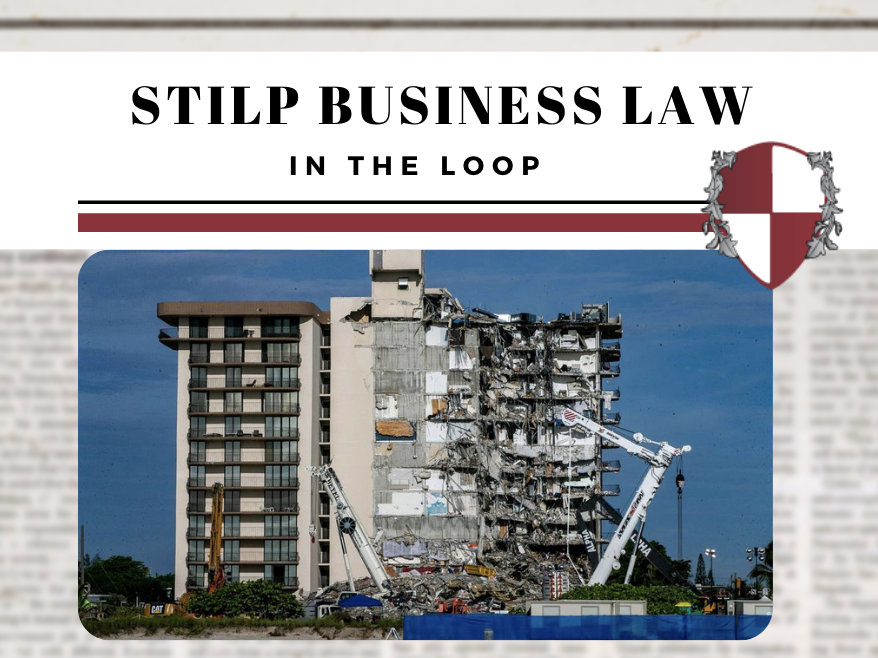Tom Stilp, JD, MBA/MM, LLM, MSC
On June 24, 2021, at approximately 1:25 a.m. EDT, Champlain Towers South, a 12-story beachfront condominium in the Miami suburb of Surfside, Florida, collapsed. The number of injured and dead make it one of the deadliest building collapses in American history.
Long-term degradation of reinforced concrete support structures in the underground parking garage due to water penetration and corrosion of the reinforcing steel are considered a factor in the cause of the collapse. (Click for Source Citation)
A quick check of the Illinois statutory condominium disclosure requirements leaves one wondering what would have been disclosed to owners and purchasers if the Miami collapsed condominium had occurred in Illinois. We have cases where structural damage occurred as the result of soil erosion, construction on an adjacent building, or the vibrations from underground subway trains in Chicago.
Minutes of board meetings will show areas of concern by the board. When representing buyers of property, it is good to routinely request the minutes from the condominium board meetings held during the last 12 months. In Champlain Towers, the board had already authorized loans of $15 million for major capital improvements and this fact is telling. (Click for Source Citation)
Any inspection reports about the condominium common elements made in the last three (3) years should be always be requested, as such reports disclose “big ticket” costs. Some attorneys argue that such documents are not required by Illinois law. But no matter – the Contract we regularly use when representing buyers provides for such “due diligence.”
A complete list of the types of documents Illinois law requires are reprinted below. Although sections of the Illinois law will help, such as Sec. 22.1(3), the better practice involves formally requesting documents through the purchase agreement, a practice at Stilp Business Law P.C. we have always followed. As grandma used to say, “If you don’t ask for the cookie, you don’t get the cookie.” We always ask. And that way, the condominium owner (or owner to be) is protected.
Excerpt – (765 ILCS 605/22.1) (from Ch. 30, par. 322.1)
Sec. 22.1. (a) In the event of any resale of a condominium unit by a unit owner other than the developer such owner shall obtain from the Board of Managers and shall make available for inspection to the prospective purchaser, upon demand, the following:
(1) A copy of the Declaration, by-laws, other condominium instruments and any rules and regulations.
(2) A statement of any liens, including a statement of the account of the unit setting forth the amounts of unpaid assessments and other charges due and owing as authorized and limited by the provisions of Section 9 of this Act or the condominium instruments.
(3) A statement of any capital expenditures anticipated by the unit owner’s association within the current or succeeding two fiscal years.
(4) A statement of the status and amount of any reserve for replacement fund and any portion of such fund earmarked for any specified project by the Board of Managers.
(5) A copy of the statement of financial condition of the unit owner’s association for the last fiscal year for which such statement is available.
(6) A statement of the status of any pending suits or judgments in which the unit owner’s association is a party.
(7) A statement setting forth what insurance coverage is provided for all unit owners by the unit owner’s association.
(8) A statement that any improvements or alterations made to the unit, or the limited common elements assigned thereto, by the prior unit owner are in good faith believed to be in compliance with the condominium instruments.
(9) The identity and mailing address of the principal officer of the unit owner’s association or of the other officer or agent as is specifically designated to receive notices.



